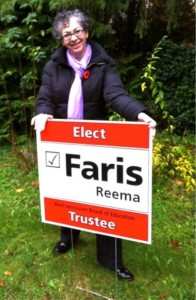Why Women’s Rights Are An Education Priority
Here are some numbers I came across while preparing for an upcoming presentation:
- Women constitute 53% of the world’s population and own 1% of the wealth
- Women still earn 20% less than men
- In Canada, women occupy only 11% of the seats on corporate boards
- Of the 308 parliamentary seats in Canada’s House of Commons, only 68 (22%) are filled by women
- According to the New York-based Women’s Media Centre, only 3% of media decision makers are women
- In the 2010 Report on the Global Gender Gap issued by the World Economic Forum, which assesses criteria such as employment equity, health care, and political representation, Canada ranked #20 — a free-fall from #7 in 2005 — putting our country behind the US for the first time ever in terms of its treatment of the female population.
What does this all mean?
I think it means that even in our developed Western world, where gender inequalities are not as apparent as they may be elsewhere, there’s a lot of work to do in sustaining women’s rights and in working towards a better, more just society. There are worrying indications and further support to be found for this need in articles such as this one from The Globe & Mail on the reduction in the number of women appointed to the judiciary.
My focus here is not to talk about the broader social policy issues — at least not today — but I would like to address what I think this may mean in terms of educating young men and women, boys and girls.
Let’s look at what some consider the three levers of our modern society — money, politics, and the media — and some subject areas or topics which could be incorporated into or emphasized in the curriculum.
Money
On the premise that the more you understand money and how it works, the better you’ll manage your own financial situation. Are we teaching enough about:
- financial literacy and budgeting?
- economics and the history of financial economics?
- how to contend with the lure of consumerism?
Unless you learn why politics is important, how our system works, and its history, you’ll never see or understand the relevance to you and the world you live in.
- Why aren’t K-12 students exploring elections as they happen? In our community, students from Capilano University helped to run the All Candidates Meeting hosted by the West Vancouver Chamber of Commerce (Trustees were not included in the official proceedings). However, as far as I know, none of the municipal candidates were invited into schools to talk to students or to answer questions. If our intent is to improve the engagement of youth in the electoral process, why not take advantage of real life situations when they are current and relevant?
- Is the history of the struggle for women’s rights highlighted when Canadian history is being taught?
- Are biographies or autobiographies of Canadian women included on reading lists for social studies courses or even as examples of non-fiction in English or French language classes?
Media
It surrounds us, it influences us, it continually evolves and changes. In a recent CBC documentary, Naomi Wolf, author of The Beauty Myth, says she finds media images of women getting worse, reinforcing unrealistic expectations and norms. Are we doing enough to educate students about the media — advertising, movies, music videos, song lyrics, newscasts, etc. — and the influence it has on our behaviours and attitudes? Did you know that misogynist comments on-line are starting to drive female journalists and bloggers off-line according to a recent article in the UK newspaper, The Guardian. Women’s voices need to be heard and represented, not shrouded in the silence of earlier eras that would negate the work of great Canadians such as Henrietta Muir Edwards, Nellie McClung, Louise McKinney, Emily Murphy, and Irene Parlby. https://archives.cbc.ca/on_this_day/10/18/
There are many other ideas and initiatives we could pursue and explore. Paying attention to these three areas would be a start because the issue of women’s rights is an issue of human rights — not just abroad, but here at home.

I agree with you totally. I believe most young women and men have no idea who Gloria Steinem, Germaine Greer are. Unfortunately ‘Feminism’ has become a negative ‘F’ word (the media definitely hasn’t helped with this). Girls and boys need to be educated on the strong women through out history and their struggles, maybe then we could see more advancement for women in our society.
We do need more women in politics but we also need more engagement in the political system, when my boys were in their teens I took them to local all candidates meeting and we discussed the different parties and candidates and where they stand on issues, if the schools aren’t doing it you can still do it yourself. We have rights but we need to also stress the responsibilities as a citizen as well.
Thank you Colleen and that’s an excellent point! I do believe that the question of citizenship and civic engagement is crucial if our intent is to ensure a vibrant and healthy democracy. I believe that’s one idea that my friend David Moscrop promotes in his book Too Dumb for Democracy? Why We Make Bad Political Decisions.